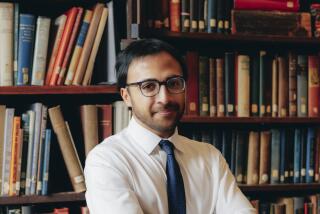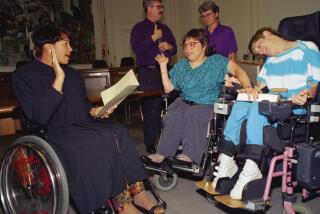Gunnar Dybwad, 92; Early Advocate for Civil Rights of Mentally Disabled
- Share via
Gunnar Dybwad, one of the world’s premier authorities in the field of developmental disabilities and an early champion of the self-advocacy movement, died Sept. 13 in Needham, Mass. He was 92.
Dybwad, a former executive director of the National Assn. for Retarded Children, was a retired professor of human development at Brandeis University, where he was founding director of the Starr Center for Mental Retardation at the Heller School for Social Policy and Management.
“Professor Dybwad was one of the first to articulate the issues facing people with disabilities as civil rights issues and not only as medical and social issues,” said Marty Krauss, director of the Starr Center. “He was a champion of the rights of people with disabilities to have full access to a normal life that everyone wants to enjoy.”
He was, Krauss said, “way before his time. He was raising fundamental questions about how society treats people with disabilities in the ‘50s and ‘60s, and it didn’t really take off until the late ‘60s.”
Dybwad is credited with playing a significant role in convincing the Pennsylvania Assn. for Retarded Children to sue on behalf of disabled children. The 1972 case led to establishment of the right of disabled children to receive a public education and helped spur the enactment of laws dealing with disability rights.
Dybwad participated in more than a dozen lawsuits advocating civil rights for the developmentally disabled. The Supreme Court dealt with two of those federal cases, and in both instances--Pennhurst State School vs. Halderman in 1981 and Board of Education vs. Rowley in 1982--the court affirmed that children with developmental disabilities have the right to treatment and education.
Born in Leipzig, Germany, Dybwad earned a doctorate in law from the University of Halle in 1934, the same year he fled Germany for the United States. A 1939 graduate of the New York School of Social Work, Dybwad served as director of the Child Welfare Program in Michigan from 1943 to 1951. He was executive director of the Child Study Assn. of America, a parent education group, from 1951 to 1957. And he served as executive director of the National Assn. for Retarded Children from 1957 to 1963.
Although Dybwad faced mandatory retirement from Brandeis in 1974 at age 65, “he never really retired,” Krauss said, and he worked at the Starr Center until two years ago.
His wife, Rosemary, herself an expert on mental retardation, died in 1992.
The couple co-founded Inclusion International, an organization of parent and self-advocacy groups.
“Gunnar and Rosemary were known around the world as friends of people with disabilities and advocates for their families,” Krauss said.
Dybwad is survived by a son, Peter; a daughter, Susan Bell; a sister; five grandchildren; and two great-grandchildren.
More to Read
Sign up for Essential California
The most important California stories and recommendations in your inbox every morning.
You may occasionally receive promotional content from the Los Angeles Times.













